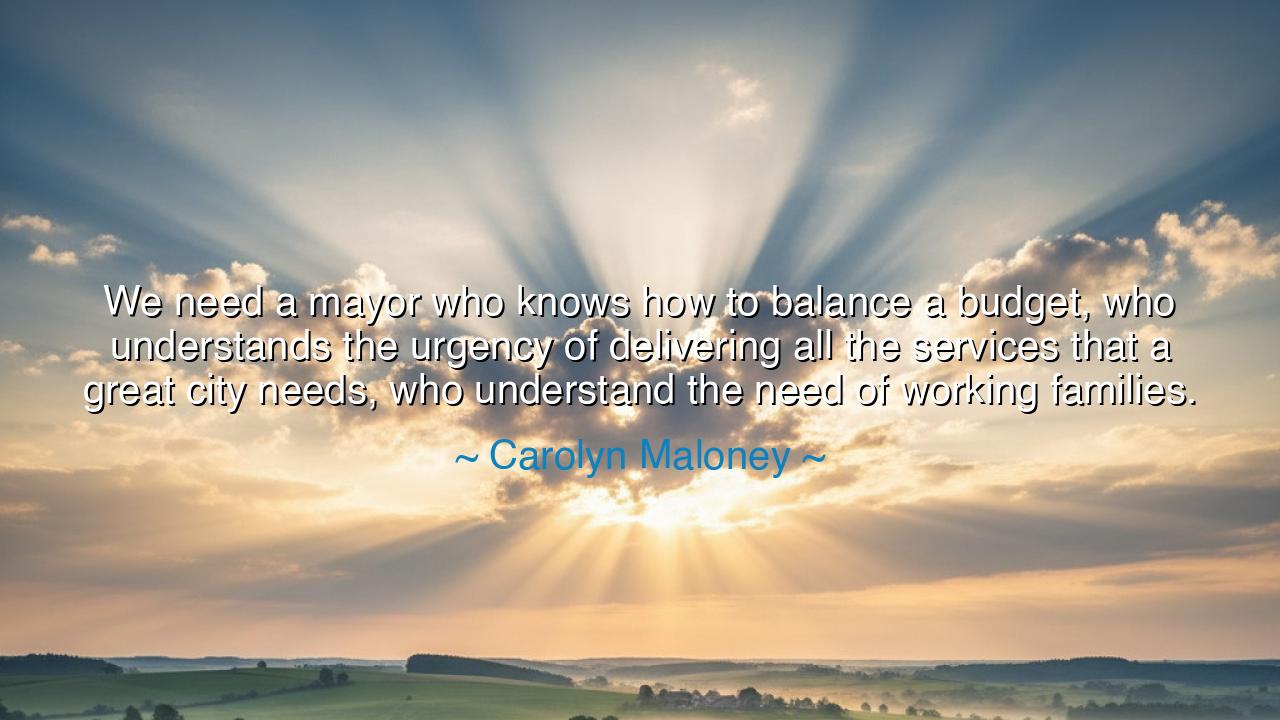
We need a mayor who knows how to balance a budget, who
We need a mayor who knows how to balance a budget, who understands the urgency of delivering all the services that a great city needs, who understand the need of working families.






“We need a mayor who knows how to balance a budget, who understands the urgency of delivering all the services that a great city needs, who understands the need of working families.” — Carolyn Maloney
In these words, Carolyn Maloney, a voice of public service and a guardian of civic responsibility, speaks not only of politics but of the ancient art of governance itself. Her statement, though addressed to her time and place, carries the echo of every age where cities have risen and fallen upon the wisdom—or folly—of their leaders. When she calls for a mayor who “knows how to balance a budget,” she speaks to the virtue of prudence, that timeless discipline of measuring means against ends, of using wealth not for vanity but for the welfare of the people. She reminds us that true leadership is not spectacle, but stewardship; not the pursuit of power, but the care of the common good.
The origin of this quote lies in Maloney’s lifelong work as a public servant and legislator, known for her tireless advocacy for families, equity, and fiscal responsibility. In her call for balanced governance, she evokes the image of a leader who sees the city not as an empire to rule, but as a living organism to sustain—each heartbeat representing the hopes of working men and women who build its foundations. Hers is a rebuke to recklessness and indifference, a cry for competence joined with compassion. For the budget of a city is not merely numbers upon a page; it is the moral document of its priorities.
From the dawn of civilization, great cities have stood as mirrors of the human soul. Athens, the birthplace of democracy, flourished when guided by wise stewardship, when its leaders understood the delicate balance between wealth and welfare, freedom and order. But when greed and neglect overtook its purpose, it descended into discord. The same pattern weaves through history—from the grandeur of Rome to the resilience of New York—each city rising upon unity and falling through corruption. Maloney’s words, then, are both a warning and a call to remembrance: that greatness cannot survive without balance—economic, moral, and human.
To “deliver all the services that a great city needs” is not merely a matter of infrastructure; it is an act of love. A city is more than its buildings—it is the people who live, labor, and dream within its walls. To govern it well is to ensure that light fills its classrooms, that its streets are safe, its hospitals strong, its homes secure. When leaders forget this sacred duty, the city decays from within. But when they remember it—when they labor to meet the urgency of the people’s needs—the city becomes not only powerful, but alive.
And yet, Maloney’s words reach even deeper when she speaks of “working families.” These are the builders of civilization—the quiet heroes who rise before dawn, who labor not for glory but for survival, who hold the fragile thread of community together through sacrifice. To understand their needs is to understand the soul of a nation. The mayor who ignores them builds on sand; the one who honors them builds on stone. In this, Maloney stands in a long tradition of leaders—from Abraham Lincoln to Eleanor Roosevelt—who believed that the strength of a country is measured not by its wealth, but by the well-being of its ordinary citizens.
Her call, therefore, is not only for a leader of one city, but for all who bear responsibility—parents, teachers, employers, and citizens alike. For leadership begins not in office, but in the heart. To “balance a budget” in life is to weigh one’s desires against one’s duties, to spend not only money but time and energy with wisdom. To “deliver services” is to give of oneself to others, to labor for the common good. And to “understand working families” is to walk with empathy, to remember that every act of governance, every decision, touches real lives.
The lesson, then, is eternal: good leadership is both practical and moral. A wise ruler must have both skill and soul—reason to govern well, and compassion to govern justly. Let those who lead remember that every city, every nation, every home stands or falls upon these twin pillars. And let those who follow hold their leaders to account, demanding not grandeur, but goodness; not rhetoric, but results.
So, my listener of the future, take these words as both guidance and charge: whether you govern a household or a city, seek balance, serve with urgency, and walk in understanding. For a leader who can balance the needs of the many with the means of the few, who honors both the numbers and the names, who remembers that the people are the heartbeat of the city—such a leader builds not only walls and roads, but a legacy that endures beyond time.






AAdministratorAdministrator
Welcome, honored guests. Please leave a comment, we will respond soon